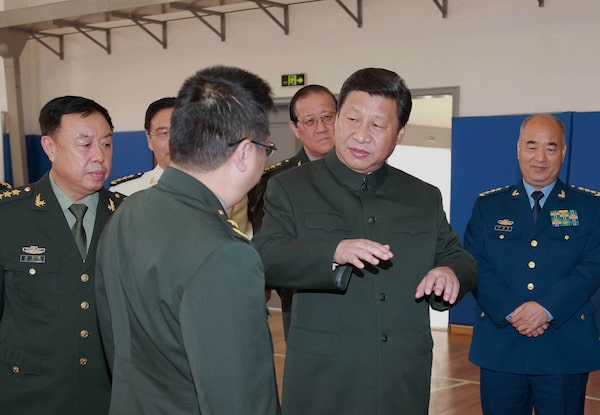
Chinese President Xi Jinping talks with scientific research staff members during his inspection tour at the National University of Defence Technology in Changsha, China, on Nov. 5, 2013.Li Gang/Newscom
Innovation Minister François-Philippe Champagne has reproached Canadian universities for collaborating with Chinese military scientists and vowed to bring in new national-security guidelines to better protect cutting-edge science and technology from ending up in the hands of China.
“I am not happy and it’s unacceptable,” Mr. Champagne told the House of Commons committee on science and research Thursday when asked about a report in The Globe and Mail that 50 Canadian universities have conducted extensive research with China’s military since 2005.
The Globe reported Monday that the joint projects with China’s National University of Defence Technology (NUDT) included research on topics such as quantum cryptography, photonics and space science. Some of the Chinese military scientists who were involved are experts in missile performance and guidance systems, mobile robotics and automated surveillance.
“I am looking to impose additional requirements when it comes to strengthening research security in Canada,” he said. “We need to ensure sensitive research and IP is adequately protected … so there will be new guidelines issued shortly.”
Mr. Champagne said Ottawa put in place stricter guidelines in 2021 to require national-security reviews for academics seeking federal funding from the Natural Sciences and Engineering Research Council (NSERC). It also promised to set up a research security centre to provide advice and guidance directly to universities.
But Mr. Champagne acknowledged that The Globe reporting on the extensive collaboration with the main military university for the People’s Liberation Army (PLA) requires further measures. He noted, however, that universities fall under provincial jurisdiction and that he can’t simply ban all university research with NUDT and other Chinese military institutions.
“But you are going to see in the next guidelines, that we are going to be issuing, that we are going to be enjoining universities across Canada to adopt similar rules to protect sensitive research and IP,” he said. “Universities need to do more.”
NUDT was blacklisted by the U.S. in 2015 – subject to export restrictions – because Washington believes it “is involved, or poses a significant risk of being or becoming involved in activities that are contrary to the national-security or foreign-policy interests of the United States.”
The Official Opposition called on the federal government to ban research partnerships with Chinese military scientists and issue an order to advise provinces and Canadian universities to do the same.
Conservative foreign affairs critic Michael Chong said Mr. Champagne needs to act even more boldly and issue a ministerial policy directive to Ottawa’s four granting bodies that sets firmer limits on research.
“It should be a directive, not guidelines, and it should ban the granting councils from funding any research in partnership with Beijing’s military,” he said.
Mr. Chong said it should also bar research with the Chinese state or its entities in artificial intelligence, quantum technology, 5G, biopharma and clean tech – areas “which have been identified by the Canadian Security Intelligence Service as targets of Beijing.”
The Conservative MP said the minister should not shy away from instructing NSERC, the Social Sciences and Humanities Research Council, the Canadian Institutes of Health Research and the Canada Foundation for Innovation, on where to draw the line.
He said if they don’t comply, and provinces don’t respond to Mr. Champagne’s call to enact national-security rules for their funding of research, then the federal government “should reserve the right to examine other alternatives,” he said, noting that Ottawa transfers billions of dollars to provincial governments each year.
Margaret McCuaig-Johnston, a former executive vice-president of NSERC and now senior fellow at the Institute for Science, Society and Policy at the University of Ottawa, said she is encouraged that Ottawa is resolving to do something about research partnerships with China.
But, she said, Mr. Champagne’s guidelines must be broader than instructing universities to avoid joint projects with NUDT.
“This is just the tip of the iceberg. There are about 60 Chinese universities and labs that are focused on the military,” she said.
Ms. McCuaig-Johnston said Canadian academics must also be aware that civilian Chinese scientists are instructed to divert any civil or dual-use research to the PLA to develop weaponry.
“Everyone recognizes the importance of academic freedom but Canadian researchers should be thinking within their souls, not partnering with Chinese researchers who maybe are helping to develop military equipment,” she said.
According to research provided to The Globe by U.S. strategic intelligence company Strider Technologies Inc., academics at 10 of Canada’s leading universities published more than 240 joint papers in the past five years with NUDT.
The Canadian Security Intelligence Service told The Globe that this type of joint research helps China obtain innovative science and technology for economic and military advantage. “The National University of Defence Technology’s name alone suggests there exists a Chinese military component to its activities,” CSIS spokesperson Brandon Champagne said.
NUDT reports to the Chinese Communist Party’s Central Military Commission and has been lauded by President Xi Jinping as a “highland for training high-quality new military personnel and for independent innovation in national defence technology.”
According to Strider’s research, the University of Waterloo tops the list of such Canadian organizations. From 2017 to 2022, the university’s researchers published 46 papers in collaboration with researchers affiliated with China’s NUDT. Some of that research, published in 2018 and 2020, involved photonics, a key enabling technology for many emerging national-security systems.
The University of Alberta was the second leading organization involved with NUDT, followed by McGill University, University of Toronto, the University of British Columbia, Simon Fraser University, the University of Victoria, McMaster University, Concordia University and the University of Calgary.
 Robert Fife
Robert Fife Steven Chase
Steven Chase